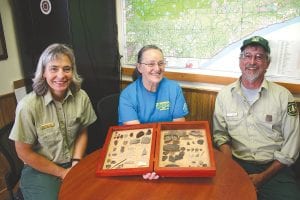Marlene Platcek (middle) recently donated artifacts found by her late husband Eldon to the U.S. Forest Service. Eldon lived in Cook County in the early 1960s for three years and spent much of his time combing the woods and watershed beaches for tools or spear points used by early nomadic people. A meticulous record keeper, Eldon documented sites still unknown to the Forest Service. Accepting the collection from Marlene were Forest Service employees Suzanne Cable and Tom Kaffine.

His obituary read, “Eldon P. Platcek, 71, of Two Harbors, died Friday, October 1, 2010 at Sunrise Nursing Home. He was born on March 9, 1939 to Arnie and Amelia (Lenertz) Platcek in Trimont, Mn. He was an avid artifact surface hunter and bottle collector. Eldon had a passion for living history, and especially a deep history of the Western United States.”
Eldon was passionate all right. He was also a perfectionist who loved detail, loved compiling information into three-ring binders, loved to look at topographical maps and imagine where people might have lived along lakes and rivers.
During the three years he lived in Cook County with his parents, Eldon and his father, Arnie, traveled about the county looking for artifacts.
Eldon wrote an article for Minnesota Archeologist printed in 1965 that Gunflint Ranger District forester Tom Kaffine came across. What he read excited him, and he was determined to find Eldon, or his descendants.
“I used Google and found out Eldon had died. Then I went searching for his wife. I found her in Two Harbors and called around and found her number. When I talked to her I asked her about Eldon’s artifacts,” Kaffine said.
“At first I was going to photograph them and give the pictures to the Forest Service,” said Marlene Platcek, “but then, after talking to Tom, I said, ‘how about if I just give them to you?’”
The two were sitting in an office at the Gunflint Ranger District office on Friday, September 5. Joining them was Suzanne Cable, Assistant District Ranger for Recreation on the Superior National Forest.
The artifacts themselves are nice, said Kaffine, but the information about them and where they were found has Forest Service staff excited, he said.
You see, Eldon not only chronicled the items, the age he determined them to be, but he mapped the place where he had found them. That eye for detail and documentation is almost unprecedented in amateur artifact hunters, said Kaffine.
Many of the sites Eldon found should hold a treasure trove of data. They are pristine because Eldon didn’t dig up sites knowing that he would destroy them, Marlene said.
Platcek lived in Cook County with his parents sometime in the early 1960s, said Marlene. They operated the Green Door cabins, she said.
“Eldon and his dad Arnie liked to hunt artifacts,” she added.
They discovered scraping tools, projectile points, iron awls, glass beads, a laurel ware pipe, end scrapers, a knife, a fragmentary knife, and a variety of copper tools.
“The copper tools could be 5,000 to 10,000 years old,” said Tom Kaffine.
Some of the locations Eldon searched were already well known, “But he found things that no one else has found at those sites,” said Kaffine. While a lot of the other sites he documented are new, and while Marlene didn’t bring the maps with her—or his three-ring binders full of detailed notes—she will be giving those to the Forest Service within the next month or so, she said.
Eldon didn’t sell his finds, nor did he share the locations of his artifacts with anybody, Marlene said.
He also collected Hutchinson pop bottles he found in southern Minnesota, and he collected and gave back old hospital bottles to Fort Union Trading Post in Montana, Marlene said. He also noted where he found each and every bottle.
Cable said she was honored to receive the collection from Marlene.
“On behalf of the Forest Service we are so pleased to get this collection,” she said.
Cable said the Forest Service would integrate the pieces into their artifact collection, research the pieces, share them with universities for study and display them publicly at times. They will also undoubtedly make their way to the Grand Portage National Monument for their perusal, said Kaffine.
“Eldon did a lot of studying and preparing. He looked at topographical maps and figured where old beaches were and where people would camp. If you really stop and look at a site, a lot of them are on the north side of a lake, and a lot them are on a point of land where it is breezy and the wind can keep the bugs off,” Marlene said.
“I hunted artifacts with Eldon, but he was the expert,” she added.
A college graduate, Eldon tried his hand at teaching, “but it didn’t work out. He worked for a while for the Forest Service, worked at Hebert’s cabins, and was curator at the 3M Museum in Two Harbors, a job he loved,” Marlene said.
As Cable noted, it is illegal to collect artifacts on Forest Service land. Still, some people have amassed collections with pieces valuable for what archeologists can learn about the people and their culture that lived in this region eons ago.
“I guess you could say Eldon was a record keeper,” Marlene said.
“This is beautifully documented work,” Kaffine said.


Leave a Reply